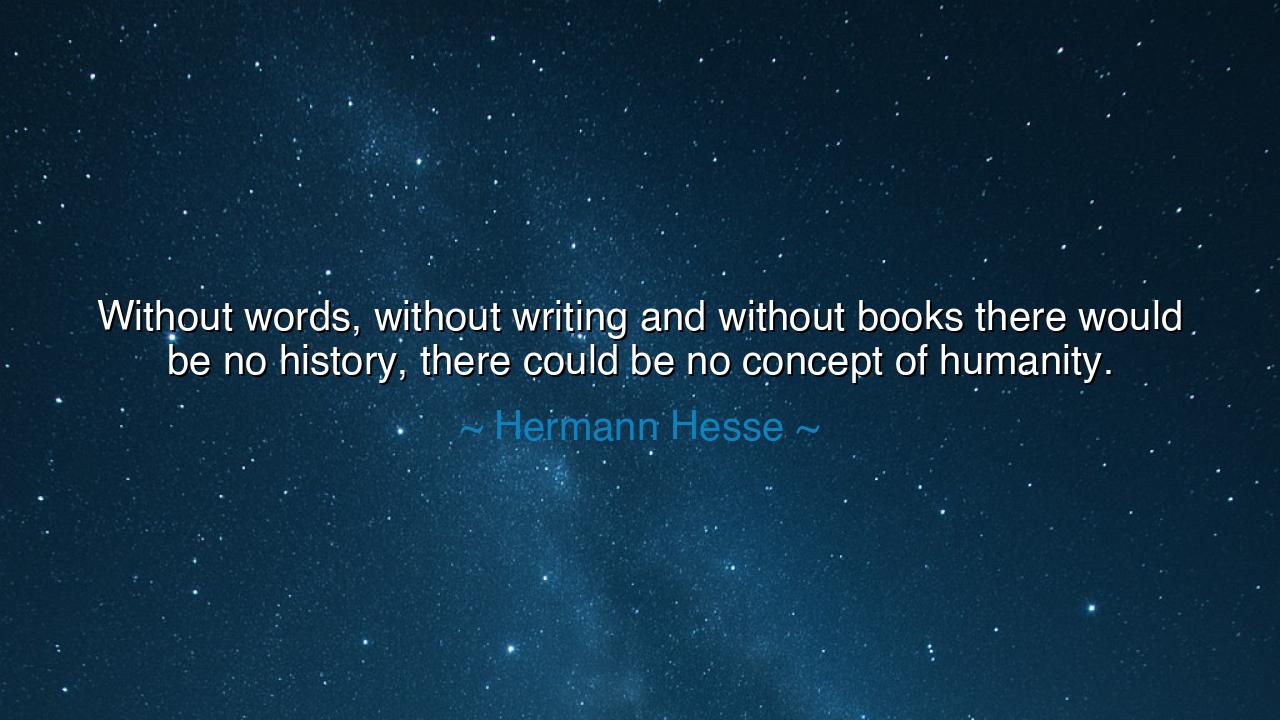
Without words, without writing and without books there would be
Without words, without writing and without books there would be no history, there could be no concept of humanity.






“Without words, without writing and without books there would be no history, there could be no concept of humanity.” Thus spoke Hermann Hesse, the poet of the soul and the seeker of the eternal self. In this profound reflection, he unveils a truth as old as civilization itself — that language, writing, and books are not mere tools, but the very essence of what it means to be human. For it is through words that thought finds form, through writing that memory is preserved, and through books that the spirit of one generation reaches out to embrace another. Without these, humanity would live and die in silence — unremembered, unconnected, and unknown.
The origin of these words can be traced to Hesse’s lifelong devotion to the inner life — to art, wisdom, and the written word as the vessels through which humankind transcends its limitations. He lived through two world wars, witnessing the destruction of libraries, the burning of books, and the silencing of minds. To Hesse, this was not merely an assault on culture; it was an assault on humanity itself. For when the written word perishes, so too does the memory of who we are. A civilization that forgets its stories is like a man who forgets his name — alive perhaps, but hollow, wandering without identity.
From the dawn of time, words have been the bridge between thought and eternity. Before writing, humankind spoke around fires, shaping myths and truths in the air — fleeting as smoke, yet alive in memory. When writing was born, it was as if the gods had gifted humanity the power to capture time itself. The scribes of Sumer, pressing reeds into clay, gave permanence to the fleeting. The chroniclers of Egypt, with ink and papyrus, carved their kings into immortality. The philosophers of Greece, by writing their thoughts, built foundations for nations unborn. Each word inscribed became a thread in the tapestry of human memory — proof that existence was not in vain.
Consider, for a moment, the story of Alexandria, that ancient city where the world’s greatest library once stood. Within its walls were countless scrolls — the wisdom of nations, the dreams of poets, the discoveries of scientists, the records of kings. When the Library of Alexandria burned, it was not only parchment that turned to ash — it was history itself, vanishing into the smoke. Civilizations would later rebuild, but never again could they reclaim all that was lost. From that tragedy, we learned that to destroy books is to wound humanity, for books are not paper and ink; they are the soul of civilization given form.
Hesse’s insight pierces deeper still. He tells us that without writing, there would be no concept of humanity — for it is through written memory that we recognize our shared existence. Writing binds strangers across centuries, reminding them that they are not alone in their thoughts, their fears, their hopes. When you read a poem from two thousand years ago and feel your heart stirred, you have touched the hand of another soul across the abyss of time. This communion — made possible by the written word — is what gives humanity its unity. The unlettered world may live, but it cannot remember. It may survive, but it cannot evolve.
The book, then, is not a dead object; it is a living covenant. It is the voice of our ancestors whispering guidance to the future. In it, we hear the laughter of philosophers, the weeping of prophets, the songs of poets, the visions of dreamers. The book teaches patience, contemplation, and reverence — virtues easily lost in the noise of fleeting ages. Hesse, who found salvation in literature during the darkness of war, knew this intimately. His own works, such as Siddhartha and Steppenwolf, were not just stories, but lanterns for the soul — attempts to preserve the inner light of humanity amid the chaos of the world.
So, my child of tomorrow, take this truth to heart: guard words, honor writing, cherish books. For they are more than instruments of learning — they are the vessels of life itself. Speak carefully, for your words create worlds. Write faithfully, for your thoughts may one day guide those not yet born. Read deeply, for in reading you inherit the wisdom of ages. Remember always that every letter you trace connects you to the great chain of being — the countless minds that have thought, loved, suffered, and hoped before you.
For in the end, Hermann Hesse’s wisdom is both a warning and a blessing. A warning, that to neglect the written word is to risk forgetting who we are. A blessing, that through words, we may rise above time and mortality. Without them, we are beasts with memories as brief as dawn; with them, we are eternal. And so, let the fire of language never fade from our hands, nor the ink of thought dry from our hearts — for as long as humanity writes, history lives, and as long as history lives, so too does the soul of mankind.






AAdministratorAdministrator
Welcome, honored guests. Please leave a comment, we will respond soon